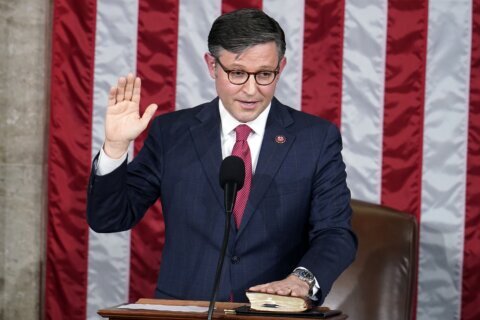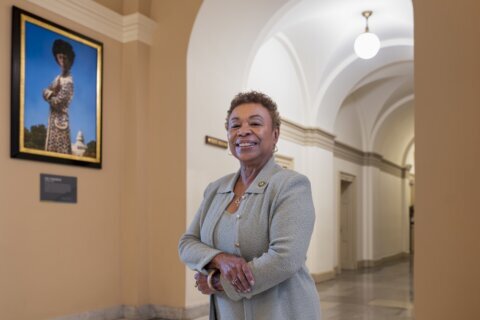WASHINGTON (AP) — Protesters can create awkward moments for presidential candidates. They interrupt, heckle and, oftentimes, knock a candidate off track.
But Vice President Kamala Harris is trying a new strategy late in the campaign to turn what would otherwise be awkward interactions into moments of energy used to rally her supporters and subtly drive her message against her Republican opponent, Donald Trump.
At all three of the Democratic nominee’s rallies on Wednesday — in North Carolina, Pennsylvania and Wisconsin — pro-Palestinian protesters broke in with chants, banners, and even a whistle to criticize Harris for how she and President Joe Biden have handled the war between Israel and Hamas in Gaza.
Gaza protesters have long targeted Harris’ events, and Biden’s when he was still the party’s nominee, hoping to use the disturbances to draw media attention to their cause. They have often prompted prolonged pauses while security officers remove the demonstrators or create uncomfortable interactions.
After three months as a candidate, and as she tries to stick to her carefully honed closing message in the final week of the campaign, Harris’ latest tactic aims to both validate protester concerns and use them as a proof point in her case against the former president.
When a protester in North Carolina yelled that Harris was “disrespecting the Palestinian community,” Harris used the moment to attack Trump.
“This is the thing, we know we’re actually fighting for a democracy,” Harris said in Raleigh. “Unlike Donald Trump, I don’t believe that people who disagree with you are the enemy.”
Hours later, in Harrisburg, Pennsylvania, Harris used a similar protest to embrace democracy.
“Look, I will repeat it, we are fighting for a democracy, we love our democracy,” she said. “It could be complicated at times, but it is the best system in the world.”
When she faced protests at the end of her night in Wisconsin, Harris used a familiar callback to what she said when then-Vice President Mike Pence attempted to interrupt her during their debate in 2020.
“We all want the war in Gaza to end and to get the hostages out and I will do everything in my power to make it heard and known,” Harris said. “And everyone has a right to be heard, but right now I am speaking.”
The moments, at each stop, energized the large crowds at Harris’ events, drowning out the protesters and turning into a way for her supporters to come together.
In Wisconsin, the response was so loud and sustained that a second group with a banner wasn’t loud enough to disrupt the event.
Despite the way the protests were drowned out on Wednesday, some pro-Palestinian figures opposed to Harris see her focus on democracy and her acknowledgment that those protesting have the right to be heard as a softening from the Democratic nominee.
“It’s nice her rhetoric has softened but the time for that has passed,” said Dearborn City Council member Mustapha Hammoud. “Instead of peace, we’ve seen an increase in violence in the war. So we can’t accept talk, we need actual outcomes.” In September, Hammoud told The Associated Press that he considered himself a Democrat until recently.
Protests are an occupational hazard for presidential candidates.
In 2016, Trump responded to a protest in Nevada by saying, “I’d like to punch him in the face.” Hillary Clinton, that same year, was regularly protested by Black Lives Matter activists, including at one event where the protesters drowned her out for 10 minutes and forced Rep. John Lewis, a civil rights icon, to ask the group to stop. And in 2020, after Biden won a slate of state primaries on Super Tuesday, anti-dairy industry protesters stormed the stage, forcing Jill Biden to protect her husband by pushing the activists aside.
“I’m a good Philly girl,” Jill Biden told reporters after the confrontation.
Harris, unlike Biden, has taken a more confrontational posture toward protesters since she won the Democratic nomination earlier this year.
When a group of pro-Palestinian protesters interrupted her at an August event by chanting, “Kamala, Kamala, you can’t hide, we won’t vote for genocide,” Harris responded directly: “If you want Donald Trump to win, then say that. Otherwise, I’m speaking.”
___
Associated Press writers Joey Cappelletti and Mike Householder in Lansing, Michigan, contributed to this report.
Copyright © 2025 The Associated Press. All rights reserved. This material may not be published, broadcast, written or redistributed.







